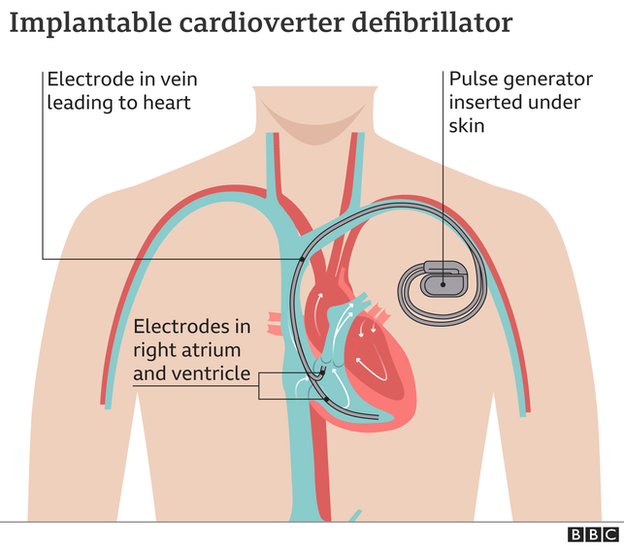Christian Eriksen to have heart-starting device fitted after collapse
- Published

Christian Eriksen required emergency treatment on the pitch before being taken to hospital
Denmark's Christian Eriksen will be fitted with a heart-starting device following his collapse on the pitch during Euro 2020.
The 29-year-old midfielder suffered cardiac arrest in his side's defeat by Finland in Copenhagen on Saturday.
The ICD - implantable cardioverter defibrillator - is "necessary due to rhythm disturbances", Danish team doctor Morten Boesen said.
Eriksen remains in hospital but says he is "fine under the circumstances".
The British Heart Foundation, external describes an ICD as a small device which is placed under the skin, is connected to the heart with "thin wires" and "sends electrical pulses to regulate abnormal heart rhythms".
Boesen added: "Christian has accepted the solution and the plan has moreover been confirmed by specialists nationally and internationally who all recommend the same treatment.
"We encourage everybody to give Christian and his family peace and privacy."

Former Spurs player Eriksen, who is now at Inter Milan, collapsed shortly before half-time against Finland and needed to be resuscitated with a defibrillator.
German doctor Jens Kleinfeld, who treated him on the field, told Funke media group: "About 30 seconds later, he opened his eyes and I could talk to him directly.
"That was a very moving moment, because in such medical emergencies in everyday life, the chances of success are much lower."
Kleinefeld said he asked Eriksen, "Well, are you back with us?"
The doctor said Eriksen answered, "Yes, I am back with you" and, "Damn, I'm only 29 years old".
Kleinefeld added: "That's when I knew the brain wasn't damaged and he had fully returned."
Denmark's next game is against Belgium on Thursday (17:00 BST) when they return to the Parken Stadium, which was the scene of Eriksen's collapse.
Belgium intend to kick the ball out of play in the 10th minute to take part in a minute's applause for Eriksen, with Danish fans planning the gesture as a show of support.
Denmark players surrounded Eriksen as he received treatment on the pitch before he was taken to hospital.
The match resumed and was played to a conclusion two hours after the incident, with Finland going on to win 1-0.
"It has been some very special days, where football has not been the most important thing," said Denmark captain Simon Kjaer.
"A shock, that will be part of me - part of all of us - forever. The only thing that is important and really matters, is that Christian is OK."
He added: "We will enter the pitch against Belgium with Christian in our hearts and thoughts. It gives us peace in our minds, which allows us to focus on the game of football.
"We will play for Christian, and as always for all of Denmark. This is the greatest motivation for us all."
'You can see the wires in my chest'

Former England cricketer James Taylor won seven Test caps before his career was ended by heart issues
Netherlands and Ajax defender Daley Blind was diagnosed with a heart condition in December 2019 and returned to action in February 2020 after having an ICD fitted.
The 31-year-old is part of his country's squad at Euro 2020 and played in their opening game, which was a 3-2 win against Ukraine.
However, former England cricketer James Taylor, 31, had his career ended by heart issues in 2016.
He was subsequently fitted with an ICD and told the BBC Sport Desk podcast, which is out on Friday, about what Eriksen can expect.
"It's a defibrillator that's fitted inside me," said Taylor. "The way I can describe it is it's half the size of your mobile phone and a little bit thicker in my chest and has two wires attached to it. Those wires are screwed into the bottom of your heart.
"I was really reluctant to have it initially, but once I had a greater understanding of my condition and how it's going to help me, it's my best friend.
"If something goes wrong, it looks after me hopefully. Very often when you have major heart surgery, it's to correct something or make something better. This was not to correct anything; this was a safety net if something goes wrong.
"I opted to have it fitted under my pectoral muscle, so you can't see it but you can see the wires in my chest - if you wanted to.
"Some have them on top of the pectoral muscle, so you can see it, but I opted to have it under the muscle so you can't really see it. If I showed you, you would be able to see it.
"One of the big things, I would say [to Eriksen], is to talk to people that you trust and also open up to people that have had a similar experience just so you learn and have an understanding of the situation, because nobody really knows."